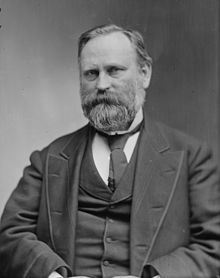
Back ستانلي ماثيوز Arabic ستانلى ماثيوز ARZ ایستنلی ماتیوس (سیاستچی) AZB Stanley Matthews (Jurist) German סטנלי מתיוס (שופט) HE Stanley Matthews (politikus) Hungarian Thomas Stanley Matthews ID Stanley Matthews (prawnik) Polish Stanley Matthews (jurist) Swedish
Stanley Matthews | |
|---|---|
 Stanley Matthews, by Mathew Brady, c. 1870-80 | |
| Associate Justice of the Supreme Court of the United States | |
| In office May 17, 1881[1] – March 22, 1889[1] | |
| Nominated by | James Garfield |
| Preceded by | Noah Haynes Swayne |
| Succeeded by | David J. Brewer |
| United States Senator from Ohio | |
| In office March 21, 1877 – March 3, 1879 | |
| Preceded by | John Sherman |
| Succeeded by | George H. Pendleton |
| Personal details | |
| Born | Thomas Stanley Matthews July 21, 1824 Cincinnati, Ohio, U.S. |
| Died | March 22, 1889 (aged 64) Washington, D.C., U.S. |
| Political party | Republican |
| Spouses | Mary Ann Black
(m. 1843; died 1885)Mary K. Theaker
(m. 1886) |
| Children | 10, including Paul |
| Relatives | T. S. Matthews (grandson) |
| Education | Kenyon College (BA) |
| Signature | |
| Military service | |
| Allegiance | |
| Branch/service | |
| Years of service | 1861–1863 |
| Rank | |
| Commands | |
| Battles/wars | American Civil War
|
Thomas Stanley Matthews (July 21, 1824 – March 22, 1889), known as Stanley Matthews in adulthood,[2] was an American attorney, soldier, judge and Republican senator from Ohio who became an associate justice of the United States Supreme Court, serving from May 1881 to his death in 1889. A progressive justice,[citation needed] he was the author of the landmark rulings Yick Wo v. Hopkins and Ex parte Crow Dog
- ^ a b "Justices 1789 to Present". supremecourt.gov. Archived from the original on April 15, 2010. Retrieved June 29, 2019.
- ^ Cushman, Clare, ed. (2013). The Supreme Court Justices: Illustrated Biographies, 1789–2012 (Third ed.). Thousand Oaks, California: CQ Press. pp. 203–206. ISBN 978-1-60871-832-0. Retrieved June 29, 2019.